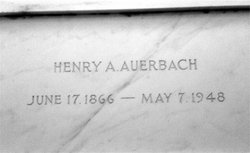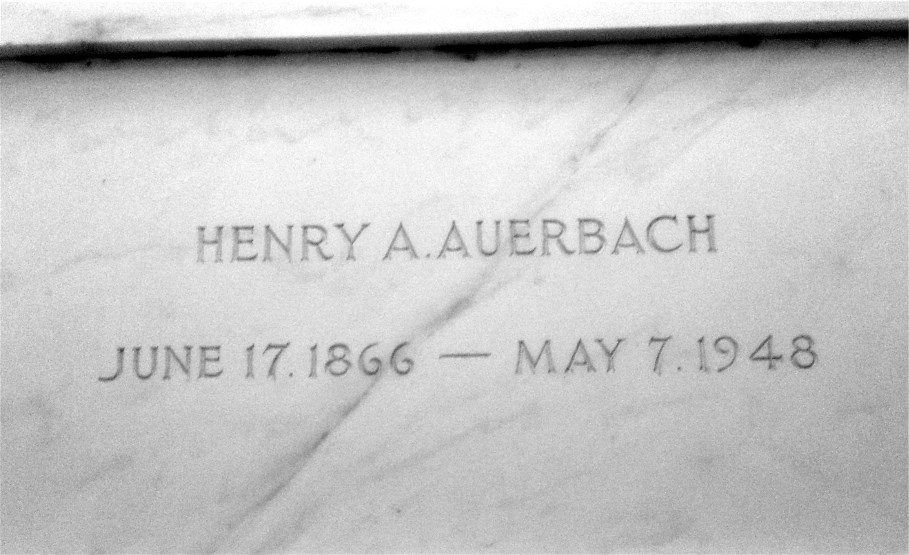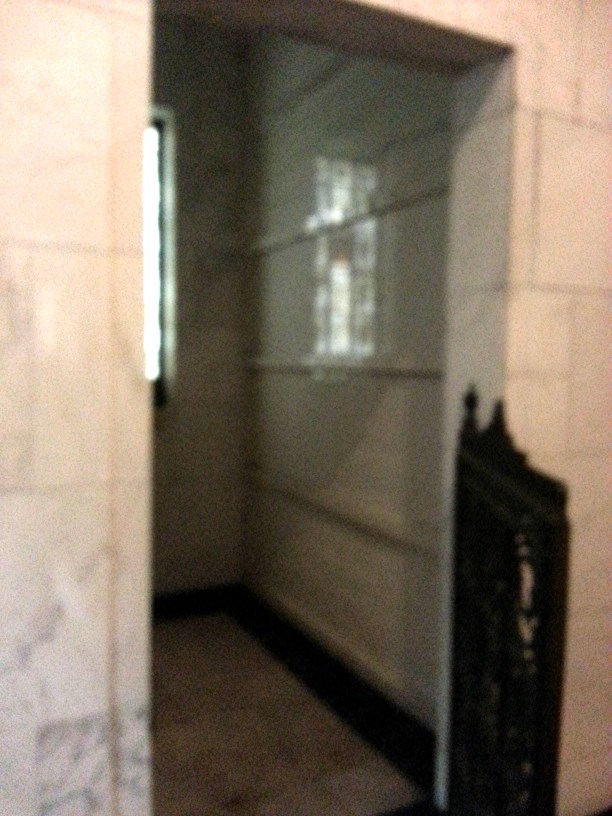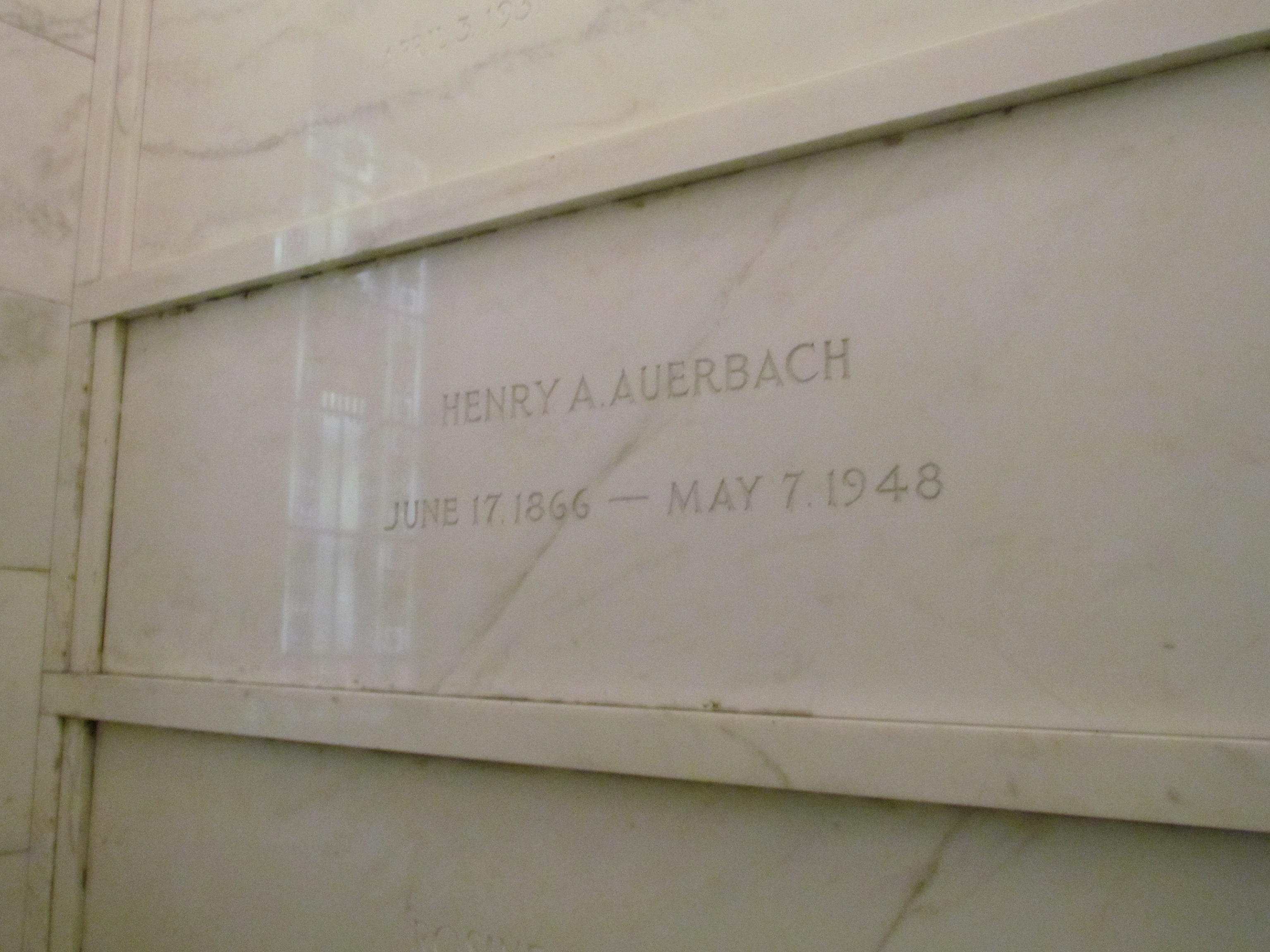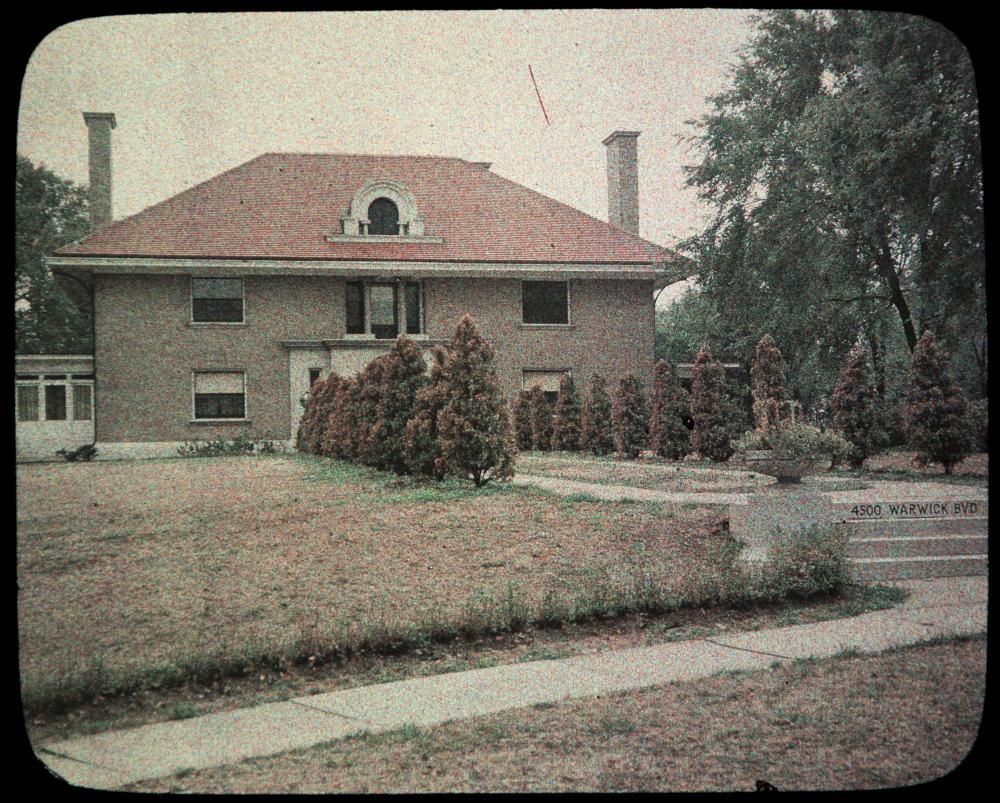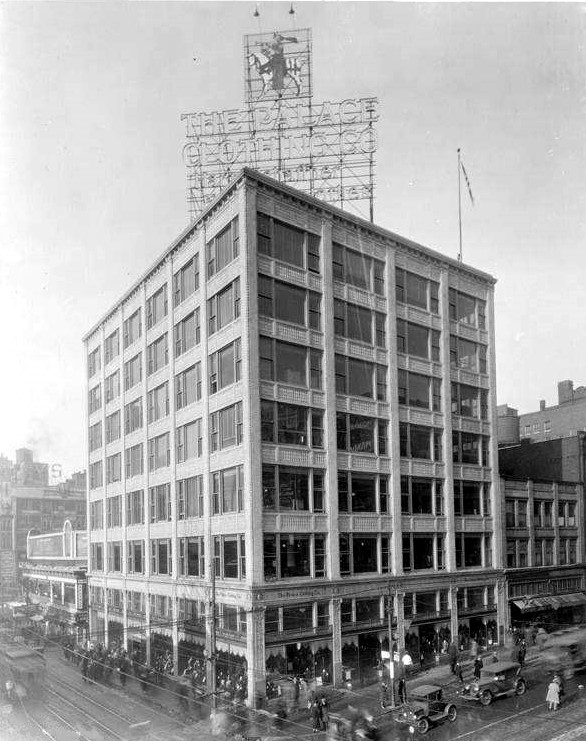Birth: in Nordstettin, Wuertemberg, Germany, date & location from 1898 passport, one of reportedly thirteen children. Its reported his parents had emigrated aboard a sailing vessel 14 June 1867 from Hamburg, Germany to end at Davenport, Scott county, Iowa.
Considerable amount of documentary material regarding their Palace Clothing company is gathered at Kansas City Public Library's with all herein included with their permission.
A Standard History of Kansas and Kansans, written and compiled by William E. Connelley, Secretary of the Kansas State Historical Society, Topeka. Chicago: Lewis Publishing Company, copyright 1918; transcribed October, 1997.
~ ~ Henry A. Auerbach
HENRY A. AUERBACH. Topekans and Kansans know and call Henry A. Auerbach a great merchant. He has been in business in that city more than a quarter of a century. He possesses and exercises those qualities which are most intimately associated with a prosperous mercantile career. He is a man of fixed and unbending integrity, of almost phenomenal energy and those who have followed his work say that three factors have been important in the results he has gained. First he and his partner each thoroughly learned the business from the bottom up. Second, each partner worked many hours while others, less ambitious, were resting. The third factor throughout their history has been honest representation in every phase of their business.
Although of foreign birth, Henry A. Auerbach is wholly American in thought, attitude and sympathies. In fact it was only the accident of birth that made him a native of Germany, since he has lived in this country since the first year of his life and has completely adapted himself to the atmosphere, thought and customs of his adopted land.
He was born at Nordstettin, Wuertemberg, Germany, June 17, 1866. In the following year his parents, Abram and Esther (Rothschild) Auerbach, emigrated to America on board a sailing vessel. His parents lived in Davenport, Iowa, where his father died in 1874. In 1875 the widowed mother removed to Chicago, and in 1896 to Kansas City, Missouri, where she died in 1906.
In these various American cities Henry A. Auerbach attended public school. At the age of fourteen he began employment as an errand boy with the firm of E. Rothschild & Brothers in Chicago. One dollar a week was his wages. Much has been said in recent times about the vocational training that might be gained by a system of a boy attending school part of the day and working in some business establishment the remaining hours. Mr. Auerbach put that principle into practice more than forty years ago. He worked with Rothschild & Brothers in the afternoon and in the morning he attended the old Bryant & Stratton Business College. That was his routine for a year and a half.
His next promotion was as index clerk in the office at four dollars a week. Later he was made shipping clerk in the store of Callahan & Company, the old established house of law book publishers at Chicago. He remained with that firm two years. Returning to the Rothschild house as cashier at ten dollars a week, he was gradually advanced until at the age of sixteen he was given the western ledger of customers in addition to other work and was gradually increased in pay to twenty-five dollars a week. At nineteen he was assistant credit man receiving a salary of fifteen hundred dollars a year, was advanced to eighteen hundred dollars at twenty, and at the age of twenty-one was receiving an annual income of two thousands dollar a year besides five hundred dollars annually for his work as confidential clerk to one of the proprietors. These facts and figures are stated for two purposes, to indicate the steps by which Mr. Auerbach climbed to a high and responsible position while most boys of that age are still working in the routine, and also as an incentive to younger men of this generation proving what youth and energy coupled with sound ability may attain.
For several years after reaching his majority Mr. Auerbach had business interests of his own at Bessemer, Michigan, and Fairfield, Iowa. These ventures were rather disastrous, though not through any fault of Mr. Auerbach, since he did not reside in either of these towns and had only his capital invested.
From the age of fifteen Mr. Auerbach's closest chum and friend was Henry A. Guettel, who subsequently became his brother-in-law. These two men had joined their capital and established a business at Fairfield, Iowa, which was conducted from 1887 to 1888. Both of them kept their home in Chicago, and the lack of personal supervision was largely the cause of their business failure.
In 1888 these partners left Chicago and came to Topeka. Topeka has really been the scene of Mr. Auerbach's upward rise as a merchant. When the partners arrived in Topeka they had practically no capital and were in fact in debt. They opened a general clothing store largely on borrowed capital. The partners worked turn about in traveling around the country in a wagon, selling goods and getting acquainted with their customers. The other partner in the meantime remained in the store at Topeka. In this way they gradually built up a wide acquaintance and laid the foundation of the extensive trade which now for fully a quarter of a century has been enjoyed by this prominent mercantile house. Successful merchandising had its proper reward, and theirs is now one of the largest and most successful retail establishments in the west. Long since every debt of the partners was paid, and not only have they kept their commercial rating A1 but the good will which goes with their business is worth more than the capital invested in many similar concerns. They have always held to the maxim of truthful advertising and representation of goods, and furthermore have injected a tremendous energy into the workings of their business. It is quite well known around Topeka that each of the partners have frequently worked eighteen out of the twenty-four hours a day. Their firm gives employment to about sixty people, and they have branch stores at Kansas City [1893], St. Joseph [1901] and Emporia [1899]. These partners are now among the largest tax payers in Topeka.
Mr. Auerbach is a life member of the Kansas State Historical Society and also belongs to the Topeka Commercial Club. In 1901 he married Miss Rosine Deutsch, a daughter of Capt. Albert B. Deutsch of Carthage, Missouri. Captain Deutsch served as a quartermaster in the second Missouri Regiment [formerly Carthage Light Guards] during the Spanish-American war. For five years he lived in Topeka, and died in that city April 19, 1916. He had for thirty-nine years been a prominent banker and merchant at Carthage, Missouri. Captain Deutsch was an exceptionally lovable character, a gentleman in all the word implies and was universally respected. His widow is still living in Topeka and both Mrs. Deutsch and her daughter Mrs. Auerbach are known for their wide but UN-ostentatious charitable work in this city. Mr. and Mrs. Auerbach have one daughter, Ruth Aline.
~ ~ ~ ~ ~ ~ ~ ~ ~ ~ ~ ~ ~
Emigrated from Hamburg, Germany following end of our Civil War, with parents, when around one year old, 14 June 1867 aboard a sailing vessel ending in Davenport, Scott county, Iowa. Raised in Davenport, lived several locals ending in Topeka, Shawnee county, Kansas where 20 JUN 1898 he became nationalized. Ten years earlier, in 1888, with brother-in-law, developed a most successful chain of clothing stores which operated seventy-six years, later known as Palace Clothing Company, he later removed to Kansas City, Jackson county, Missouri where the family passed away.
1924 was year they moved into their newly constructed, 12th & Grand avenue, seven story Kansas City store building, ~ ~ partner's son Arthur closing its doors following forty successful years, a store that, following WW II, I enjoyed while living in Kansas City area.
Statement of Significance:
The Palace Clothing Company Building is eligible for listing in the National Register of Historic Places according to criteria A and C and is significant in the following areas: ARCHITECTURE: Designed in 1924 by Kansas City architect Frederic E. Mcllvain, the seven story structure is one of the most expressive examples of Chicago style architecture in Kansas City because its form so clearly expresses the utilitarian and structural function of the building. By emphasizing openness and mass, the design also points to the elegance and flexibility of the "neutral cage".
COMMERCE: The Palace Clothing Company, established in 1893 in Kansas City by Henry A. Guettel and Henry A. Auerbach became one of the largest clothing stores of its kind in the West and one of the nation's most outstanding stores merchandising men's and boy's clothing. Since 1921, the business grew from a one and a half million dollar volume to more than six million dollars of business before the company closed its doors in 1964, a non-inflationary growth of 242%.
Iowa-born Henry A. Guettel (1866-1921), while working for a prominent wholesale clothier in Chicago, met his future brother-in-law and co-partner of the Palace Clothing Company, Henry A. Auerbach. It was in 1888 that Guettel and Auerbach formed a partnership and established the first Palace Clothing Company in Topeka, Kansas.
Continually considering expansion, Guettel and Auerbach explored the business district in Kansas City and in 1893 purchased, coincidentally, the Palace Clothing Store, located at 909 Main. This became their first affiliate business.
In 1921, they purchased the Ridge Property, which housed the Palace Clothing business and changed its name to, the Palace Building. During those twenty-eight years, because continued growth necessitated substantial remodeling and expansion, the Palace Clothing Company had become one of the largest clothing stores in the country, with frontage of 275 feet. Guettel and Auerbach had also opened two more affiliate locations; one in Emporia, Kansas (1899) and another in St. Joseph, Missouri (1901).
Auerbach had remained in Topeka managing the original store, soon to move family to Kansas City to live out their lives.
Death: in Kansas City, Jackson county, Missouri while residing at 420 east Armour Boulevard, Missouri Death Certificate, informant, daughter Ruth.
Father: Abraham Auerbach b: 1 AUG 1835 Germany, died 30 DEC 1874 Davenport, Scott county, Iowa.
Mother: Emma Rothschild b: about 1836 Germany, died 2 MAR 1906 Kansas City, Jackson county, Missouri.
Sister: Martha (Auerbach) Guettel.
Marriage: Rosine Deutsch b: 30 AUG 1878 Carthage, Jasper county, Missouri.
Married 25 JUN 1901 Cook county, Illinois.
Known Children
Ruth Aline Auerbach b: 1 MAR 1903 Topeka, Shawnee county, Kansas.
"Baby Auerbach" b: 27 SEP 1906 Topeka, Shawnee county, Kansas.
Prepared in part by: Bill Boggess
Birth: in Nordstettin, Wuertemberg, Germany, date & location from 1898 passport, one of reportedly thirteen children. Its reported his parents had emigrated aboard a sailing vessel 14 June 1867 from Hamburg, Germany to end at Davenport, Scott county, Iowa.
Considerable amount of documentary material regarding their Palace Clothing company is gathered at Kansas City Public Library's with all herein included with their permission.
A Standard History of Kansas and Kansans, written and compiled by William E. Connelley, Secretary of the Kansas State Historical Society, Topeka. Chicago: Lewis Publishing Company, copyright 1918; transcribed October, 1997.
~ ~ Henry A. Auerbach
HENRY A. AUERBACH. Topekans and Kansans know and call Henry A. Auerbach a great merchant. He has been in business in that city more than a quarter of a century. He possesses and exercises those qualities which are most intimately associated with a prosperous mercantile career. He is a man of fixed and unbending integrity, of almost phenomenal energy and those who have followed his work say that three factors have been important in the results he has gained. First he and his partner each thoroughly learned the business from the bottom up. Second, each partner worked many hours while others, less ambitious, were resting. The third factor throughout their history has been honest representation in every phase of their business.
Although of foreign birth, Henry A. Auerbach is wholly American in thought, attitude and sympathies. In fact it was only the accident of birth that made him a native of Germany, since he has lived in this country since the first year of his life and has completely adapted himself to the atmosphere, thought and customs of his adopted land.
He was born at Nordstettin, Wuertemberg, Germany, June 17, 1866. In the following year his parents, Abram and Esther (Rothschild) Auerbach, emigrated to America on board a sailing vessel. His parents lived in Davenport, Iowa, where his father died in 1874. In 1875 the widowed mother removed to Chicago, and in 1896 to Kansas City, Missouri, where she died in 1906.
In these various American cities Henry A. Auerbach attended public school. At the age of fourteen he began employment as an errand boy with the firm of E. Rothschild & Brothers in Chicago. One dollar a week was his wages. Much has been said in recent times about the vocational training that might be gained by a system of a boy attending school part of the day and working in some business establishment the remaining hours. Mr. Auerbach put that principle into practice more than forty years ago. He worked with Rothschild & Brothers in the afternoon and in the morning he attended the old Bryant & Stratton Business College. That was his routine for a year and a half.
His next promotion was as index clerk in the office at four dollars a week. Later he was made shipping clerk in the store of Callahan & Company, the old established house of law book publishers at Chicago. He remained with that firm two years. Returning to the Rothschild house as cashier at ten dollars a week, he was gradually advanced until at the age of sixteen he was given the western ledger of customers in addition to other work and was gradually increased in pay to twenty-five dollars a week. At nineteen he was assistant credit man receiving a salary of fifteen hundred dollars a year, was advanced to eighteen hundred dollars at twenty, and at the age of twenty-one was receiving an annual income of two thousands dollar a year besides five hundred dollars annually for his work as confidential clerk to one of the proprietors. These facts and figures are stated for two purposes, to indicate the steps by which Mr. Auerbach climbed to a high and responsible position while most boys of that age are still working in the routine, and also as an incentive to younger men of this generation proving what youth and energy coupled with sound ability may attain.
For several years after reaching his majority Mr. Auerbach had business interests of his own at Bessemer, Michigan, and Fairfield, Iowa. These ventures were rather disastrous, though not through any fault of Mr. Auerbach, since he did not reside in either of these towns and had only his capital invested.
From the age of fifteen Mr. Auerbach's closest chum and friend was Henry A. Guettel, who subsequently became his brother-in-law. These two men had joined their capital and established a business at Fairfield, Iowa, which was conducted from 1887 to 1888. Both of them kept their home in Chicago, and the lack of personal supervision was largely the cause of their business failure.
In 1888 these partners left Chicago and came to Topeka. Topeka has really been the scene of Mr. Auerbach's upward rise as a merchant. When the partners arrived in Topeka they had practically no capital and were in fact in debt. They opened a general clothing store largely on borrowed capital. The partners worked turn about in traveling around the country in a wagon, selling goods and getting acquainted with their customers. The other partner in the meantime remained in the store at Topeka. In this way they gradually built up a wide acquaintance and laid the foundation of the extensive trade which now for fully a quarter of a century has been enjoyed by this prominent mercantile house. Successful merchandising had its proper reward, and theirs is now one of the largest and most successful retail establishments in the west. Long since every debt of the partners was paid, and not only have they kept their commercial rating A1 but the good will which goes with their business is worth more than the capital invested in many similar concerns. They have always held to the maxim of truthful advertising and representation of goods, and furthermore have injected a tremendous energy into the workings of their business. It is quite well known around Topeka that each of the partners have frequently worked eighteen out of the twenty-four hours a day. Their firm gives employment to about sixty people, and they have branch stores at Kansas City [1893], St. Joseph [1901] and Emporia [1899]. These partners are now among the largest tax payers in Topeka.
Mr. Auerbach is a life member of the Kansas State Historical Society and also belongs to the Topeka Commercial Club. In 1901 he married Miss Rosine Deutsch, a daughter of Capt. Albert B. Deutsch of Carthage, Missouri. Captain Deutsch served as a quartermaster in the second Missouri Regiment [formerly Carthage Light Guards] during the Spanish-American war. For five years he lived in Topeka, and died in that city April 19, 1916. He had for thirty-nine years been a prominent banker and merchant at Carthage, Missouri. Captain Deutsch was an exceptionally lovable character, a gentleman in all the word implies and was universally respected. His widow is still living in Topeka and both Mrs. Deutsch and her daughter Mrs. Auerbach are known for their wide but UN-ostentatious charitable work in this city. Mr. and Mrs. Auerbach have one daughter, Ruth Aline.
~ ~ ~ ~ ~ ~ ~ ~ ~ ~ ~ ~ ~
Emigrated from Hamburg, Germany following end of our Civil War, with parents, when around one year old, 14 June 1867 aboard a sailing vessel ending in Davenport, Scott county, Iowa. Raised in Davenport, lived several locals ending in Topeka, Shawnee county, Kansas where 20 JUN 1898 he became nationalized. Ten years earlier, in 1888, with brother-in-law, developed a most successful chain of clothing stores which operated seventy-six years, later known as Palace Clothing Company, he later removed to Kansas City, Jackson county, Missouri where the family passed away.
1924 was year they moved into their newly constructed, 12th & Grand avenue, seven story Kansas City store building, ~ ~ partner's son Arthur closing its doors following forty successful years, a store that, following WW II, I enjoyed while living in Kansas City area.
Statement of Significance:
The Palace Clothing Company Building is eligible for listing in the National Register of Historic Places according to criteria A and C and is significant in the following areas: ARCHITECTURE: Designed in 1924 by Kansas City architect Frederic E. Mcllvain, the seven story structure is one of the most expressive examples of Chicago style architecture in Kansas City because its form so clearly expresses the utilitarian and structural function of the building. By emphasizing openness and mass, the design also points to the elegance and flexibility of the "neutral cage".
COMMERCE: The Palace Clothing Company, established in 1893 in Kansas City by Henry A. Guettel and Henry A. Auerbach became one of the largest clothing stores of its kind in the West and one of the nation's most outstanding stores merchandising men's and boy's clothing. Since 1921, the business grew from a one and a half million dollar volume to more than six million dollars of business before the company closed its doors in 1964, a non-inflationary growth of 242%.
Iowa-born Henry A. Guettel (1866-1921), while working for a prominent wholesale clothier in Chicago, met his future brother-in-law and co-partner of the Palace Clothing Company, Henry A. Auerbach. It was in 1888 that Guettel and Auerbach formed a partnership and established the first Palace Clothing Company in Topeka, Kansas.
Continually considering expansion, Guettel and Auerbach explored the business district in Kansas City and in 1893 purchased, coincidentally, the Palace Clothing Store, located at 909 Main. This became their first affiliate business.
In 1921, they purchased the Ridge Property, which housed the Palace Clothing business and changed its name to, the Palace Building. During those twenty-eight years, because continued growth necessitated substantial remodeling and expansion, the Palace Clothing Company had become one of the largest clothing stores in the country, with frontage of 275 feet. Guettel and Auerbach had also opened two more affiliate locations; one in Emporia, Kansas (1899) and another in St. Joseph, Missouri (1901).
Auerbach had remained in Topeka managing the original store, soon to move family to Kansas City to live out their lives.
Death: in Kansas City, Jackson county, Missouri while residing at 420 east Armour Boulevard, Missouri Death Certificate, informant, daughter Ruth.
Father: Abraham Auerbach b: 1 AUG 1835 Germany, died 30 DEC 1874 Davenport, Scott county, Iowa.
Mother: Emma Rothschild b: about 1836 Germany, died 2 MAR 1906 Kansas City, Jackson county, Missouri.
Sister: Martha (Auerbach) Guettel.
Marriage: Rosine Deutsch b: 30 AUG 1878 Carthage, Jasper county, Missouri.
Married 25 JUN 1901 Cook county, Illinois.
Known Children
Ruth Aline Auerbach b: 1 MAR 1903 Topeka, Shawnee county, Kansas.
"Baby Auerbach" b: 27 SEP 1906 Topeka, Shawnee county, Kansas.
Prepared in part by: Bill Boggess
